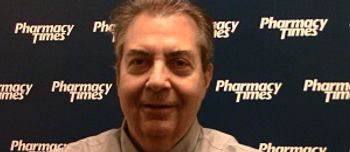
Elias Cachine, PharmD, discusses the potential complications that can arise as a result of antibiotic overuse in geriatric patients.

Elias Cachine, PharmD, discusses the potential complications that can arise as a result of antibiotic overuse in geriatric patients.

Demetra Antimisiaris, PharmD, CGP, FASCP, discusses the pharmacist's role in treating patients who are experiencing renal impairment.

Demetra Antimisiaris, PharmD, CGP, FASCP, discusses ways to avoid unintentional errors in renal dose adjustments.

Demetra Antimisiaris, PharmD, CGP, FASCP, discusses the best methods to use to estimate creatinine clearance levels.

Demetra Antimisiaris, PharmD, CGP, FASCP, discusses the potential complications that can arise from improper renal dosing.

Demetra Antimisiaris, PharmD, CGP, FASCP, discusses the factors that contribute to inappropriate renal dosing.

Beverly Schaefer, RPh, of Katterman's Sand Point Pharmacy in Seattle, Washington, talks about how to market traveling services at a pharmacy.

Donnie Calhoun, RPh, PD, National Community Pharmacists Association (NCPA) Foundation vice president, discusses how the Pharmacy Disaster Support Center can help pharmacists.

Ken Whittemore Jr, Surescript's senior vice president of professional and regulatory affairs, shares information on the current and future estimates of e-prescribing use.

Liz Tiefenthaler, president of Pharm Fresh Media, talks about what makes patients loyal to one pharmacy.

David D'Altorio, PharmD, senior vice president of health services at MedImpact Healthcare Systems, Inc, discusses how the ACA has impacted the specialty landscape.

James Schiffer, RPh, associate at Allegaert Berger & Vogel LLC, discusses some safeguards independent pharmacies can implement to avoid issues with controlled substance prescriptions.

Bryan Ziegler, PharmD, executive director of Kennedy Pharmacy Innovation Center, talks about important health care quality metrics for pharmacists and comments on how pharmacists can be active in driving value-based reimbursement.

Elias Cachine, PharmD, BCPS (AQ-10) explains what steps pharmacists should take when treating infections in geriatric patients.

James Schiffer, RPh, associate at Allegaert Berger & Vogel LLC, discusses what happens to a pharmacy if it is found to be out of compliance with DEA regulations or federal statutes.

Ryan Nolan, PharmD, MBA, CSP, clinical services manager at Diplomat, discusses ongoing lessons from the market reaction to high cost hepatitis C treatments.

Jon Hamrick, executive vice president, Biotech and Specialty Services at Therigy LLC, discusses methods to overcome the challenge of high out-of-pocket costs that can have a negative impact on patient medication adherence.

Liz Tiefenthaler, president of Pharm Fresh Media, talks about some ways that pharmacists can improve the image of their business among patients.

Mark Parkinson, CEO of the American Health Care Association, discusses how payment models in the post-acute care industry have changed over the past 5 years.

Todd Semla, MS, PharmD, BCPS, FCCP, AGSF, National PBM Clinical Pharmacy Program Manager at the US Department of Veterans Affairs, discusses how to updated 2015 AGS Beers Criteria reflects new warnings about opioid use.

Todd Semla, MS, PharmD, BCPS, FCCP, AGSF, of the Department of Veterans Affairs explains how the AGS 2015 Beers Criteria will affect pharmacists' practice.

Beverly Schaefer, RPh, of Katterman's Sand Point Pharmacy in Seattle, Washington, shares what kinds of vaccinations pharmacists should expect to offer to their patients who travel abroad.

Ronna B. Hauser, PharmD, vice president of pharmacy affairs for the National Community Pharmacists Association (NCPA), talks about the current position of the FDA regarding compounding.

Donnie Calhoun, RPh, PD, National Community Pharmacists Association (NCPA) Foundation vice president, discusses how the Pharmacy Disaster Support Center is different from similar centers.

Ken Whittemore Jr, Surescript's senior vice president of professional and regulatory affairs, discusses some flaws of e-prescribing.

James Schiffer, RPh, associate at Allegaert Berger & Vogel LLC, discusses some red flags related to controlled substance prescriptions.

Ken Whittemore Jr, Surescript's senior vice president of professional and regulatory affairs, discusses some of the ways in which e-prescribing trumps traditional prescriptions.

Cheryl Allen, RPh, BSPharm, MBA, vice president of Industry Relations at Diplomat, discusses the services offered by Diplomat's HUB EnvoyHealth program.

Neil Friedman, COO of Bodimetrics, explains how pharmacists can best leverage the Bodimetrics Performance Monitor technology in their day-to-day practice.

After experiencing 18 hold-ups during his pharmacy career, James Schiffer, RPh, associate at Allegaert Berger & Vogel LLC, discusses his past fears of going to work.